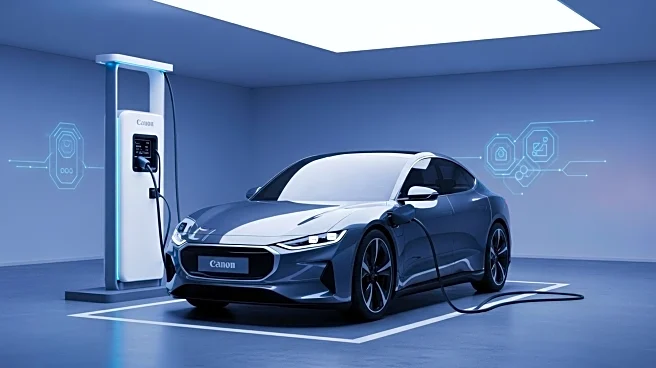What is the story about?
What's Happening?
Tesla has experienced a significant increase in electric vehicle sales, with a 7% rise in the last quarter compared to the previous year. This surge is attributed to the rush of buyers seeking to capitalize on a federal $7,500 tax credit for new electric vehicles, which expired on September 30. The increase in sales marks a rebound for Tesla, which had been facing challenges such as declining sales and brand damage. The company delivered 497,099 vehicles in the third quarter, up from 384,122 in the previous quarter. Despite the sales boost, Tesla shares fell by more than 3% due to ongoing market saturation and federally imposed auto tariffs.
Why It's Important?
The expiration of the federal tax credit has led to a temporary spike in electric vehicle sales, benefiting Tesla and other brands like Cadillac. This development highlights the significant impact of government incentives on consumer behavior and the automotive market. The surge in sales provides a short-term boost for Tesla, which has been struggling with brand challenges and market saturation. However, the expiration of the tax credit may lead to a decline in sales in the coming months, affecting Tesla's long-term growth prospects. The situation underscores the importance of government policy in shaping industry dynamics and consumer choices.
What's Next?
With the expiration of the tax credit, electric vehicle sales are expected to decline, posing challenges for Tesla and other automakers. Tesla's future growth may depend on its ability to innovate and expand its autonomous driving technology and robotaxi venture. The company will need to address issues with its self-driving efforts to successfully roll out its robotaxis nationwide. Additionally, Tesla must navigate the impact of auto tariffs and market saturation in California to maintain its competitive edge. Stakeholders will be closely monitoring Tesla's strategies to sustain growth in a changing market environment.
Beyond the Headlines
The surge in electric vehicle sales due to the expiring tax credit highlights broader implications for the automotive industry and environmental policy. It raises questions about the sustainability of relying on government incentives to drive consumer adoption of green technologies. The situation also reflects the challenges automakers face in balancing innovation with regulatory and market pressures. As Tesla and other companies adapt to these dynamics, the industry may see shifts in business models and strategies to align with evolving consumer preferences and policy landscapes.














